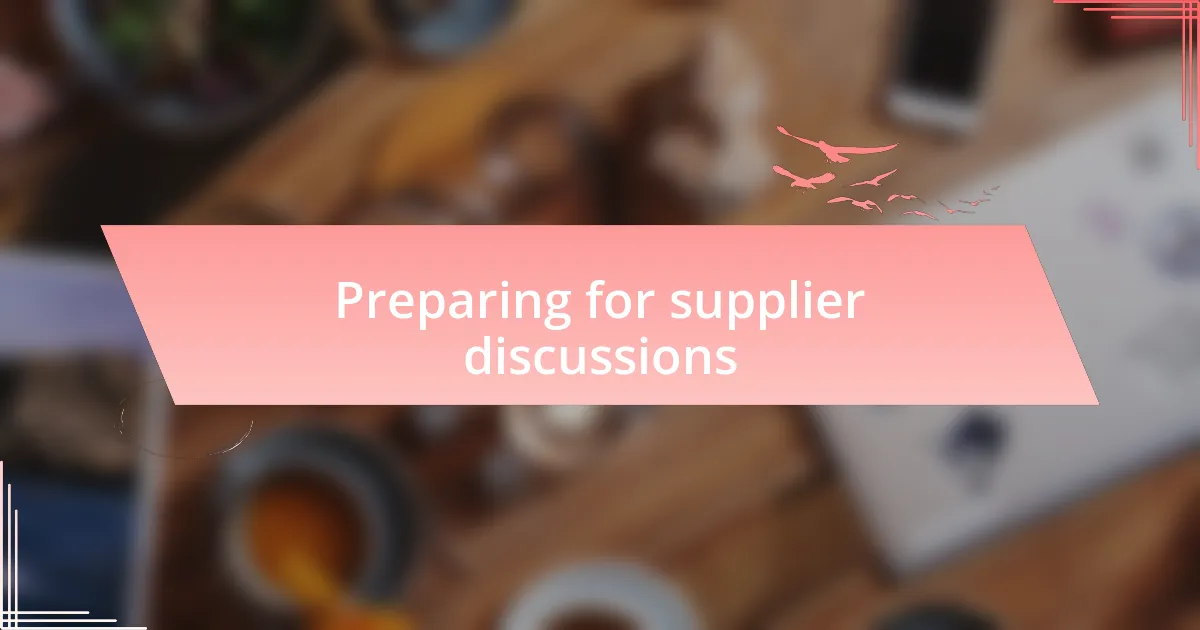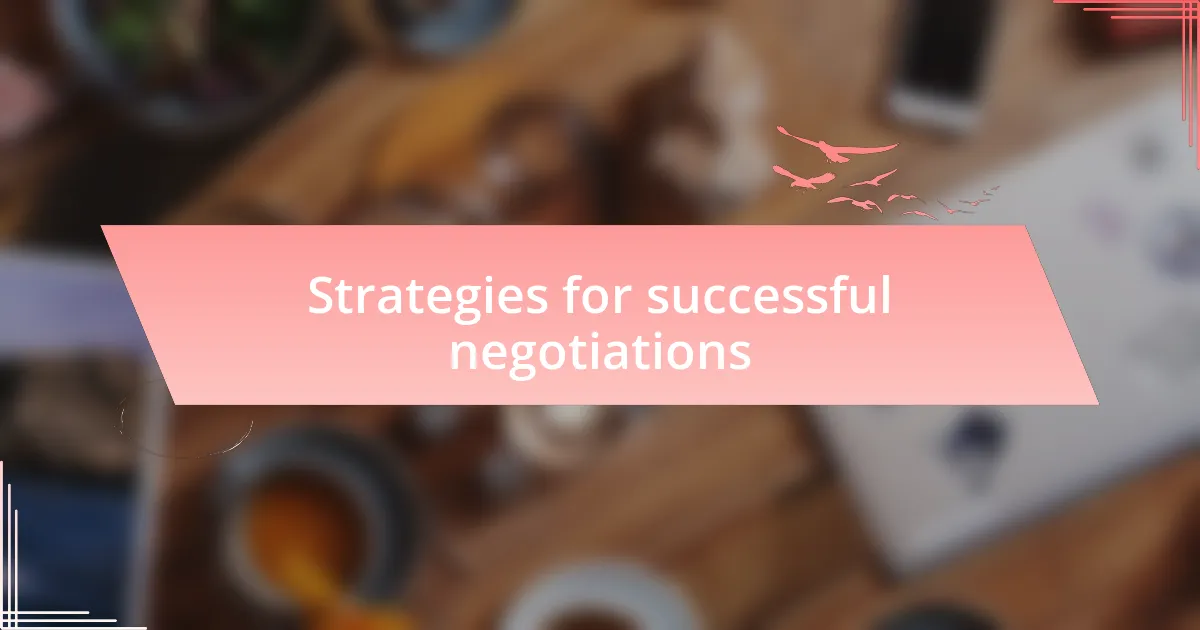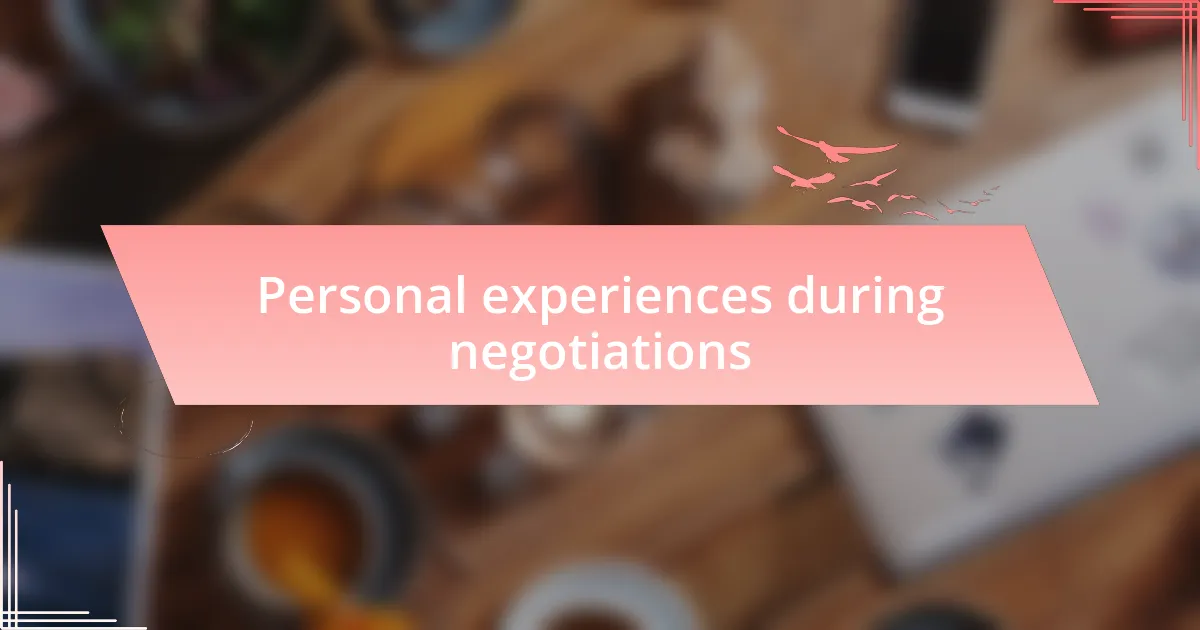Key takeaways:
- Approaching supplier negotiations as partnerships fosters trust and can lead to mutually beneficial outcomes.
- Preparation, including understanding market dynamics and setting clear goals, is crucial for successful negotiations.
- Active listening during discussions can uncover valuable insights and opportunities for collaboration.
- Building relationships through proactive communication and appreciation enhances supplier loyalty and responsiveness.

Understanding supplier negotiations
Supplier negotiations are often more complex than we realize. For instance, I once found myself in a tough position with a supplier who was vital to our fresh produce line. The tension in the room was palpable; I knew that my approach could significantly impact our costs and the quality of what we served our customers. Have you ever felt that weight on your shoulders during negotiations?
Understanding the dynamics at play is crucial. I learned to see suppliers not just as vendors but as partners in our journey. This perspective changed everything for me; it fostered trust and opened up avenues for collaboration that I hadn’t anticipated. When we approach negotiations with the mindset of a partnership rather than a battlefield, the outcomes can be mutually beneficial.
It’s also essential to listen actively during these discussions. I recall a moment when a supplier shared insights about market trends that I had never considered. Their input not only informed my decisions but created a rapport that paid off in the form of better pricing down the line. Engaging in dialogue, rather than a one-sided pitch, can lead to surprising revelations that enhance both parties’ success.

Importance of effective negotiation
Effective negotiation is essential because it directly affects the bottom line of your business. In my experience, securing favorable terms with suppliers not only reduces costs but also strengthens the overall relationship. Have you ever walked away from a negotiation feeling both relieved and empowered? That rush is a clear indication of how effective negotiation can elevate your business strategy.
Negotiation isn’t just about price—it’s about value. Once, I was negotiating a contract for ingredients that would define a new menu. By focusing on the benefits of collaboration rather than just the numbers, I was able to secure not only a price reduction but also exclusive access to specialty products. The emotional high of that moment reinforced the idea that when you seek a win-win outcome, everyone walks away satisfied and more invested in the relationship.
Maintaining transparency during negotiations can drastically shift dynamics. I vividly recall a conversation where I openly discussed my budget constraints with a supplier. This honesty led to them providing alternatives that I hadn’t even considered. Have you ever let your guard down in a negotiation, only to find it fortified the relationship? That vulnerability can create a path for creative solutions that might otherwise go unexplored. The importance of effective negotiation is not just in the transactions but in the lasting relationships and opportunities it can foster.

Preparing for supplier discussions
Preparing for supplier discussions starts with thorough research. I always find it beneficial to understand the market landscape. Knowing the supplier’s strengths and weaknesses, as well as my own needs, gives me leverage during discussions. Have you ever walked into a meeting feeling completely prepared? That sense of readiness can be a game-changer.
Another crucial step is setting clear goals. I’ve made the mistake of entering negotiations without a defined outcome, and it led to a lot of back and forth without real progress. This time, I decided to outline what I wanted—better pricing, delivery schedules, and quality assurances. That clarity not only focused my approach but also communicated seriousness to my suppliers. Ask yourself: what do you truly want from this relationship?
Finally, I believe practicing active listening is essential. During negotiations, I’ve often found that the most valuable insights come from simply paying attention. In one memorable discussion, I learned that a supplier had a new sourcing strategy that could benefit my business, and I hadn’t even asked about it. Have you ever noticed that listening can open doors you didn’t know existed? It’s a powerful tool that fosters collaboration and lays the groundwork for successful outcomes.

Strategies for successful negotiations
Once the groundwork is laid, I find that establishing rapport is key in negotiations. Building a personal connection with suppliers creates an atmosphere of trust. I remember a time when I shared a lighthearted story about a mix-up with an order, and it transformed the conversation. Suddenly, the tone lightened, and we started to see each other not just as business partners but as people too. Have you ever noticed how a simple story can break down barriers?
Another strategy that has served me well is being open to compromise. In my early days, I was rigid about my demands, which often led to stalemates. I learned that flexibility can lead to win-win situations. For instance, during one negotiation, I adjusted my expectations on delivery timelines in exchange for better pricing. That willingness to bend resulted in a partnership that has lasted years. Isn’t it fascinating how a small concession can build a stronger relationship?
Finally, I find that closing the deal effectively is just as important as the discussions leading up to it. I often summarize our agreements before wrapping up, ensuring everyone is on the same page. There was a moment when I failed to do this, and it led to misunderstandings later. Now, I ask questions like, “Do we all agree on these terms?” It might seem simple, but I’ve found that clarity at the end reinforces commitment. Have you ever closed a deal only to have details unravel later?

Building relationships with suppliers
Building strong relationships with suppliers goes beyond just transactional interactions; it’s about fostering trust. I recall an instance when I invited a supplier to our kitchen for a tasting session. By sharing our passion for food, we connected over our mutual love for flavor and quality. It’s amazing how something as simple as a shared meal can strengthen a bond, don’t you think?
Communication plays a crucial role in relationship building. I’ve learned that checking in with suppliers regularly, even when there isn’t a pressing issue, shows that I value them. During one of these casual conversations, a supplier shared insights about upcoming trends that informed my purchasing decisions. Have you ever thought about how a little proactive communication can lead to unexpected opportunities?
Lastly, acknowledging a supplier’s efforts can make a significant difference in our relationship. I make it a point to express gratitude when they go above and beyond, whether it’s an expedited delivery or an extra effort to meet quality standards. I remember when a supplier stayed late to ensure my order was ready on time. Sending a quick thank-you note might seem small, but it has resulted in a more responsive and reliable partnership. Isn’t it fascinating how appreciation can create loyalty?

Personal experiences during negotiations
Negotiations can often feel intimidating, but I’ve found that a personal touch can ease the tension. I once faced a particularly challenging conversation about pricing with a supplier I admired. Instead of diving straight into figures, I opened with a story about how their product played a pivotal role in one of our signature dishes. It turned the discussion from a hard negotiation to a collaborative conversation, making both of us feel invested in the outcome. Have you ever noticed how storytelling can shift the atmosphere in a room?
Another memorable negotiation involved a last-minute order for a busy holiday weekend. I remember sitting across from my supplier, feeling the pressure rise. Instead of just pleading for flexibility, I shared how their product’s quality significantly impacted our reputation during peak times. This honesty not only built rapport but also prompted them to offer me a discount. Isn’t it interesting how vulnerability can actually strengthen negotiations?
I also learned the power of patience in negotiations. During a long-winded back-and-forth with a new supplier over contract terms, I made a conscious effort to listen actively. It was revealing how often I could identify a common ground when I allowed them to express their concerns fully. I felt a genuine connection forming, one where both parties walked away feeling heard and appreciated. How often do we rush negotiations without truly listening to what the other side has to say?

Lessons learned from my negotiations
One of the most significant lessons I learned is the importance of preparation. There was a time I walked into a negotiation without fully assessing my supplier’s position or alternatives. Once I realized they were considering other partners, the conversation took a different turn. Reflecting on this, I understood how essential it is to gather as much information as possible beforehand, as knowledge empowers negotiation strategies. Have you ever entered a situation unprepared and felt the immediate difference?
Another eye-opener was when I experimented with different negotiation styles. Initially, I was very formal and direct, which sometimes led to misunderstandings. Then, I decided to try a more relaxed approach, using humor and friendliness. In one instance, a laugh over a shared industry challenge completely changed the dynamic. It dawned on me how flexibility in style could lead to better outcomes—has your tone ever altered the atmosphere in a negotiation?
Lastly, I discovered that not every negotiation has to end in a win-lose scenario. I recall a moment when a supplier suggested a higher price than anticipated. Instead of reacting negatively, I proposed a package deal that could benefit both parties. This collaborative mindset not only secured the deal but also built a stronger partnership. What would happen if we approached negotiations with a mindset of shared success rather than division?